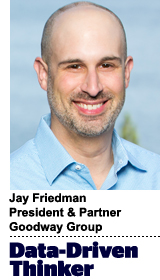
“Data-Driven Thinking” is written by members of the media community and contains fresh ideas on the digital revolution in media.
Today’s column is written by Jay Friedman, president and partner at Goodway Group.
Accenture Interactive’s recent purchase of creative agency Droga5 presents a fundamental question of whether consulting and creative can be combined effectively.
Can a creative shop and a consulting firm really get along?
This question boils down to the old right brain vs. left brain dynamic. The consulting companies’ underlying qualitative and metrics-driven principles are at odds with creativity.
Let’s examine further with a slightly exaggerated analogy: casinos. The chances of betting on a single number in roulette and winning are 2.6%, yet people do it fully believing they can win. The chances of creating the next “Got Milk?” or “Just Do It” are even smaller, but marketers and agencies across the world launch thousands – if not hundreds of thousands – of ad campaigns each year with the hope that they’ve bottled lightning and their campaign is the next jackpot.
While the average bet at a casino has a net negative return, the average ad campaign has a net positive return, even if it’s not the jackpot the brand hoped for. Announcing a full name change from IHOP to IHOB was a stunt to let the world know about IHOP’s burgers, and it seems to have been a big winner. However, Pepsi’s Kendall Jenner ad generated what most consider to be losses well beyond the money the brand poured into the campaign itself; imagine going all-in at a casino and losing more than you had to begin with.
This lack of predictability is likely to create strain between consultancies and creative shops. Consultants are financially minded and prefer to run projections to demonstrate outcome. This is hard, if not impossible, to do with creative. Since consultancies inherently want to provide highly predictive results, and creative is anything but highly predictive, the likelihood of being aligned on how to solve a client’s problems is low.
Brands have long hired consultants to provide sure-fire recommendations to improve bottom-line results. The ability of great consultants to dig through financials, identify a brand’s strengths, weaknesses, opportunities and threats and learn how to capitalize on this information is what allows a typical consulting firm to charge more than $1 million for an eight- to 12-week engagement. Consultancies typically don’t hire people who recommend solutions with limited predictability because it’s not what the client asked for.
Viewed through a consultant’s lens, every ad campaign is unpredictable. Rarely is any scientific testing done before or even during the campaign to know with statistical confidence that the dollars being spent are generating a quantifiable positive return. Media-mix modeling is far from an exact science. Cross-channel attribution is limited by technology and walled-garden policies.
This is where it will be interesting to see how the rigor-driven culture of consulting meets the creative side of advertising. Both are absolutely needed, but that doesn’t mean they’ll get along.
On paper, McKinsey identified that approximately 70% of the mergers or acquisitions in its database failed to create the upside each company hoped for before agreeing to the deal. The odds are against even the most synergistic acquisitions, and it’s hard to conceive that a culture of rigor-first MBAs will marry nicely with one where numbers are almost impossible to run until the money has been spent and the idea is in the wild.
Programmatic advertising has shown us over the past decade that it is the future of media. We’ve spent countless hours attempting to quantify milliseconds, tenths of pennies and percentages of shared conversions. This is where media and all of advertising is going.
Being this quantitative with creative will come, but I’m not sure it will come soon enough for Accenture and Droga5 to extract all the value they hoped from their future together.
Follow Jay Friedman (@jaymfriedman) and AdExchanger (@adexchanger) on Twitter.
This post was syndicated from Ad Exchanger.


More Stories
Marketing Morsels: Hidden Valley Ranch, La-Z-Boy, Topps & More
Flashback: Jane Pauley and Deborah Norville Revisit Today’s 1989 Succession Drama
Ally Financial Revives ‘Banksgiving’ With A TikTok Twist